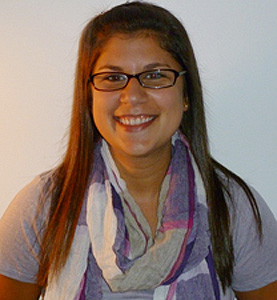
Rising senior and human development and family studies major Stephanie Godbout had a moment in high school when she saw what creativity could do in the life of a child. She was job shadowing a speech pathologist one day, and watched him use a speech board with a young boy who has lost his verbal communication skills during brain surgery.
“The child was communicating, and it was incredible to me that the pathologist had helped him do that,” Godbout says.
Godbout, the 2010-2011 winner of the Clyde A. Jones Scholarship from Human Development and Family Studies, follows in the footsteps of Professor Jones, an early childhood specialist who used creativity in his daily dealings with students and encouraged them to use it to stir the minds of the children with whom they were working. Although Jones died in 2009, his educational philosophies live on through his former students, and through his scholarship. (Read a moving memorial to Jones, who also left a bequest to his church in Cobleskill, N.Y.)
Jones was an artist-turned-educator who, his former students say, used art as an avenue to reach students.
“He came at curriculum with this idea that teachers should use what children are interested in and what they love when developing curriculum, that it should be about a unity with beauty and nature, and all sorts of complicated premises that really were not part of curriculum development back then,” says Meg Galante-DeAngelis, a longtime lecturer at UConn and one of Jones’ former students.
“In his class, our work was very exacting; we did a lot of measurements using principles of visual design, he talked a lot about color and puppetry and all sort of things he was interested in,” she adds. “I repeat to my students something he always said to us: he thought that the youngest children should have the most-well-educated teachers because they couldn’t communicate easily all of their desires. The more educated a teacher was, the more easily she would understand what a child needed.”
Another former student, Maureen Mulroy, now associate professor emeritus of human development and family studies, remembers Jones as quiet and yet, as she says, “a marvelous teacher.”
“He was a great early childhood educator – he was never a friend, but I was allowed a certain degree of collegial equality after I got my Ph.D. and improved myself – he was difficult, demanding, fair, peculiar, a bit of a peacock, and really from the old school of early childhood education.
Others became friends of Jones once he retired, when he could be seen outdoors drawing pencil sketches of scenes throughout Storrs, then sending them to friends.
“He was an artist who got a Ph.D. in human development, so he got an academic wrapping around that,” says emeritus professor Irene Brown, who befriended Jones when he was living at a healthcare facility in Mansfield. “He was interesting in that he thought about the child in what we would call a progressive way, that a child should be exposed to the arts. And he was devoted to UConn; the fact that he made this donation is a sign of his commitment to this institution. Every fall we would have a celebration of the scholarship students with the donors, and he would come.”
 Now that Jones is deceased, the students who win his scholarship know little about their benefactor. But they are grateful to him nonetheless.
Now that Jones is deceased, the students who win his scholarship know little about their benefactor. But they are grateful to him nonetheless.
Godbout, this year’s winner of the Clyde Jones Scholarship, is one of four children in a family that couldn’t afford to pay for her to attend college, and she has used work-study and scholarships to get through UConn. She was the valedictorian of her graduating class at Bristol Central High School and a Presidential Scholarship recipient whose education has taken her out of UConn’s classrooms and into the public schools, where she has observed classes. She also works part-time in UConn’s Child Development Laboratories, and appreciates the on-site experience. “Human development and family studies really gets students involved,” she says.
The curriculum has changed over the years, but the philosophy remains the same. “I credit Clyde Jones and others in the program with really preparing us well for advanced graduate education,” says Mulroy, “and for helping us understand the opportunities that were just beginning to be open for the strong voiced and the stiff-spined women who were making a difference then.”
And now.
Says Godbout, “I find the things I am learning are really exciting. And the scholarship really helps.”
To give to the Human Development and Family Studies program, please contact the Foundation’s development department.


